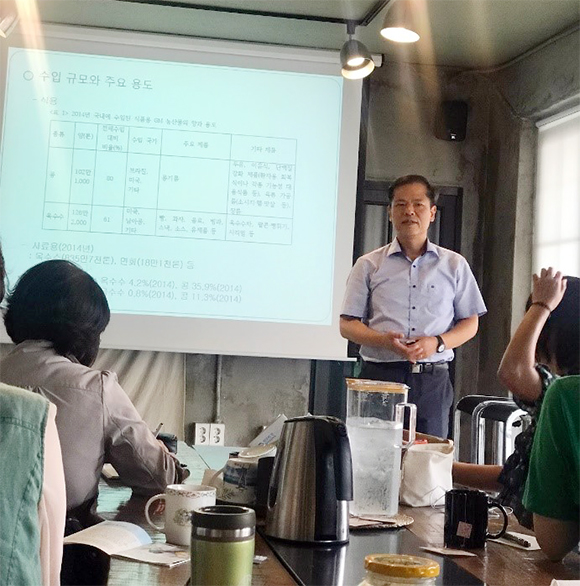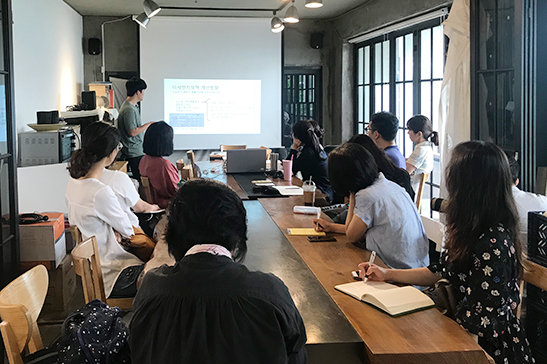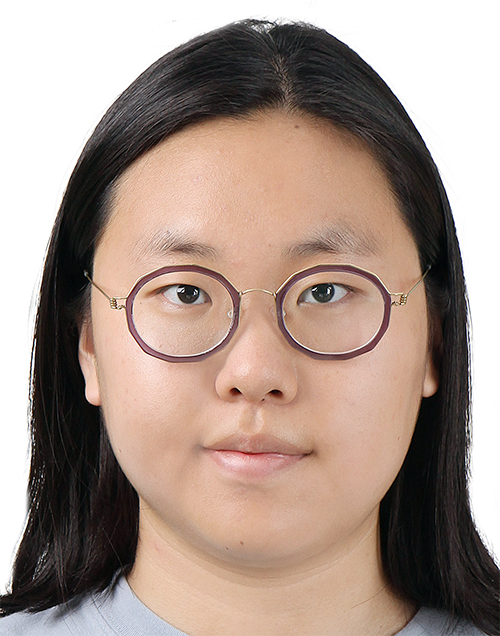A genetically modified organism (GMO), an organism or microorganism whose genetic material has been altered by means of genetic engineering, is a hot topic in science today because it is projected to play a big role in our future society. This is because our future society is expected to go through exponential population growth and not have enough food sources to sustain it. Scientists believe that GMO will be able to solve this problem with increased productivity. As a fervent supporter of organic food, I wanted to attain more information about GMO which could be a threat to organic food. As an intern of the Korean Environmental Movement Coalition, I had the chance to attend a lecture by professor Hoongi Kim, a professor at Hongik University, on June 19th.

[Professor explaining about the GMO market in Korea, photo courtesy of Eunji Ko]

Before talking about the pros and cons of GMO, the professor specifically focused on the GMO markets and policies in Korea. GMO has entered Korea due to exporting countries that insisted on the usage of GMO. As a result, 80% of our imported products are GMO. The problem is that there is no way for the consumers to know if a product is GMO. While it is true that there are GMO labeling systems in Korea, there are too many exceptions. For one, all oil companies are not forced to label their products as GMO because the government argued that in the process of manufacturing oil, the danger of GMO, which only exists in protein level, is minimal. Applying the same logic, the government also exempted all soy sauces and saccharides, both fundamental materials for cooking, from the labeling policy. The problem is that the government’s logic hasn’t been scientifically proven. Therefore, before anything is scientifically proven, it should be consumers’ right to judge the GMO’s health impact. In other words, the government should adopt the labeling of all GMO products, or else the government will violate the citizen’s right to know as well as their bodily autonomy.
Here we should ask the question: “is GMO effective?” My answer would be partially yes. Ji hak Han, a research director of Nongwoo Bio, argued in his interview with Science On that GMO is doing its job in increasing the productivity. He said that the average yield of GMO beans was 21% higher than normal beans, and the average yield of GMO corns was 16% higher.
Then we should ask the question: “is GMO really trustworthy?” The promises that producers of GMO had made was the reduction of the usage of herbicide and the preservation of the ecosystem. However, both promises are not being kept. For instance, the usage of herbicide, especially that of glyphosate, a substance that WHO designated as carcinogenic, not only continues but has increased. This is because of the increased tolerance of herbicides in the weeds near GMO crops. One would be stupid to expect this tolerance to stay at the weed level. Scientists have already started the study of tolerance within insects, and they believe that it is only a matter of time that the insects gain tolerance. Thus, GMO cannot ensure the reduction in herbicide and the larger safety of our ecology.
GMO also can’t safeguard the survival of Korean farmers. Most of the companies that have the seed or patent related to GMO is a multinational company. This creates a vertical relationship between the farmers and the companies. For example, those companies intentionally produce seeds without crossbreeding abilities in order to prevent farmers from using them without paying them. Furthermore, they insert a gene in the plant that only allows a specific herbicide to work – a herbicide made by that specific company. In other words, innocent farmers without technology and knowledge are helpless against the companies with massive capital.
In the end, participation high level of public participation in the regulation of GMOs is in dire need. There have been positive outcomes from citizens’ protest. For one, the government has abolished the policy that exempted the GMO labeling if its ratio was under 6th most included products. Like this, the only thing that can ensure our safety is our action.

Eunji Ko
12th grade
Korean Minjok Leadership Academy

